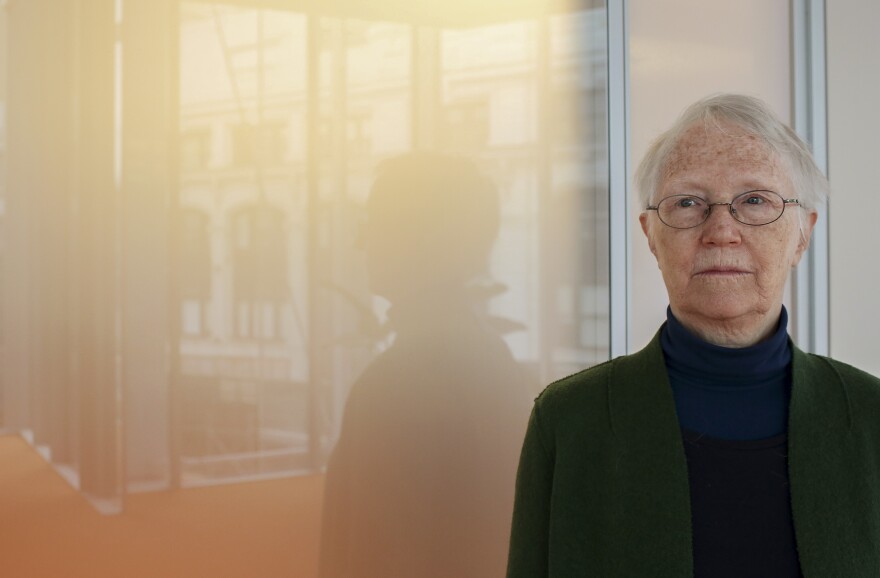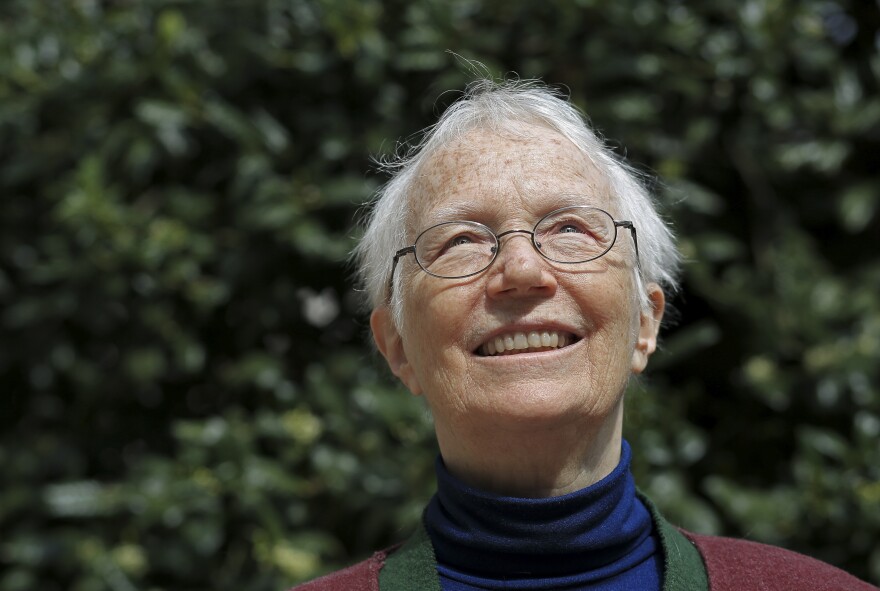For scientist – and former farmer – Cynthia Rosenzweig, her work on climate change has always revolved around one big question: "So what?"
"Impacts of climate change are crucially important," she says. "If the climate changes and nothing happened, why would we care?"
In the early days of climate science in the '80s, she was one of the first researchers making projections of how the changing climate would affect North American crops. Still, the researcher at NASA's Goddard Institute of Space Studies knew she needed to go further.
That's why years before her NASA colleague James Hansen gave key 1988 Congressional testimony outlining the link between greenhouse gasses and climate change, Rosenzweig wrote him a note about climate change. She told him she wanted to expand her computer modeling to better understand its potential impact on global crops.

For the better part of the last four decades that's what Rosenzweig has done. She tells NPR that while her first climate modeling work may have started with her sitting at a computer, her more recent work means she's on farms around the world, engaging with stakeholders to determine how crops are already affected by the climate crisis and what can be done about it.
She's the founder of the "Agricultural Model Intercomparison and Improvement Project" or "AgMIP," a multi-disciplinary team of more than 1,000 researchers worldwide working on climate modeling and agriculture. Now Rosenzweig has won the World Food Prize for her work helping the global community recognize and predict climate change's effect on food systems and her leadership to give countries new solutions to ease the impact.
In our interview, Rosenzweig, the head of the Climate Impacts Group at the NASA Goddard Institute for Space Studies at Columbia University, explains why tackling the climate crisis and food requires new approaches to research, fields a question from a worried farmer in Nigeria and tells how she keeps her own eco-anxiety at bay. The interview has been edited for length and clarity.
You've been looking at climate change and farming since the 1980s. What in your work has surprised you?
The surprise is that the extreme events have started to become more severe, longer duration, more frequent, earlier, I think, than we had anticipated. Starting around the turn into the 2000s, this increase in extreme events in agricultural regions around the world – that's been the surprise.
In the 1980s when did you think that we'd see a 40% reduction in crop yield? By 2030?
Or the 2050s, maybe even beyond 2050.
Can you tell me more about what you put into these models and how you designed [them] on a 1980s computer?
There had been groups around the country developing crop models to answer management questions – "how much fertilizer to put on to help farmers?" Things like that. But what I realized was that these are the models that will be very, very useful to answer climate change questions.
So what these models do is basically grow crops in the computer. You actually specify a planting date when you put the seeds in. And then the inputs of daily weather, daily temperature, daily precipitation and also solar radiation and the CO2 level in the atmosphere. So I worked with crop modeling colleagues and we added in the equations for higher CO2 effects on the crops.
When did you realize climate change was the most significant threat to planetary food systems?
In 1994 with the first global study that we did with crop modelers. The results started coming in from all over the world, and we were so excited we started making a hand-drawn map of the changes in the yields from the climate change scenarios.
And when we made the hand-drawn map, we saw in developing countries in the lower latitudes all the yellows, oranges and browns [signifying lower crop yields]. And that's when we realized that the food systems in developing countries located in those lower latitudes are facing the greatest impact of climate change. This really was the "aha moment" for me to see the significance of climate change, the downward pressure on yields, especially for the poorest farmers in the world.
Northern Nigeria would have been an area that would be brown — the biggest drops in crop harvests?
Would have been brown, yep.
I'm going to share with you a question from a farmer in Northern Nigeria, whom I spoke to yesterday. Nasir Abdullahi. He was telling me what he's been seeing in the last few years on his farm. He sees so much hunger in his region, not just from the loss of crops with climate change, but also the lack of food from political insecurity with Boko Haram, plus violence between farmers and herdsmen, which is also related to climate change.
What we're really facing now is triple threats, or quadruple threats, quintuple threats. So we have climate change, which is happening already, projected to worsen in the coming decades. We also have the COVID pandemic. And then we see conflict arising as well.
Abdullahi has already experienced a 30% loss of his millet crop last year. He says the rains come late, then they stop, and then they come again harder with flooding. He's wondering if you have any solutions?
AgMIP now has an "A-team," which stands for the Adaptation teams. We work with developing countries to help ask, "Well what can we do about it?" If the pattern of rainfall is changing, let's develop and evolve the agricultural systems to have planting dates when the rain is occurring. We're looking at heat and drought tolerant crops to recommend.
So for example, in Ghana, also in West Africa, we have an AgMIP A-team there, the team found those kinds of results that [Abdullahi] was experiencing. And then they recommended to the [Ghanaian] government to develop longer life cycle varieties [of crops] which adjust to that potential change.

It sounds like the fact that I brought you a question from a farmer isn't that revolutionary. It sounds like you're already integrating questions from people on the ground.
This is what we call stakeholder-driven research. We don't think of the questions that we want to ask with our AgMIP model toolkit. We first go into listening mode.
And you're listening to ...
Whoever it is – farmers, planners, national decision-makers. So first we listen and we ask them: What would you like to know about?
In Zimbabwe, stakeholders urged the AgMIP A-Team to include a market for mucuna in the regional economic model protocols. Mucuna is a legume that helps productivity in the small-scale farmer crop and livestock system there.
So it's not just us thinking about what, "You know what, oh we think you need this." We go back and incorporate those stakeholder-driven responses into our protocols.
It reminds me of how people who've developed "long COVID" are sharing their symptoms and insights with scientists so that they can rapidly develop the research based more acutely on the specific questions.
That's absolutely right. We used to do the science and then really kind of literally throw it over the fence. We realize now that with climate change, we have to bring policy experts with us as well. So we call it the double helix of science and policy. Now, from the beginning, we are saying, "Here's what the science is showing. What policies could be used right away?"
For example, payment for soil-carbon sequestration – how do you design a model that's actually going to work? Modelers can do the modeling of soil carbon sequestration in the fields. Right? But the policy experts are figuring out what's the best way to do payment for ecosystem services programs.
I feel like there are a lot of people who, when they think about crop failure, when they think about hunger, when they think about all the challenges we're tackling, there's eco-anxiety, there's this immense sadness. And that can be immobilizing and make people feel as if there's nothing to be done. It sounds like even in 1994, you weren't immobilized. How do you keep going? How do you combat those feelings?
Because I've been so fortunate in my career to work with people all over the world, my fellow crop modelers, my wonderful climate scientists, the AgMIP community, to help their countries respond to climate change – it gives me hope. There is such an energy around helping save the planet.
That's why food is so important because everybody on the planet eats. The food system offers all these opportunities to roll up sleeves and work on solving climate change.
AgMIP models are verifying how farmers' practices such as no-till and cover crops are actually helping to reduce greenhouse gas emissions. AgMIP is holding a workshop this month on these activities. And it's real, the challenges are very real. But what I see is so many people in the food system collectively getting going on creating the solutions.
So it sounds like you don't even consider the concept of failure.
No, I don't. I don't. You know why? We cannot fail. We must solve it. We must solve it for the health of every single person on the planet.
You were enthusiastic from the get-go.
Yes, very much so. [Laughs.] You've known me for a half an hour, you can tell, that's how I am!
Do you have a plan for what you plan to do with the money?
Well, yes. Not an exact plan, but I'm going to donate it all to research on climate change and food. All of it.
Julia Simon is a regular contributor to NPR's podcasts and news desks, focusing on climate change, energy and business news.
Copyright 2022 NPR. To see more, visit https://www.npr.org. 9(MDA3OTAzNzgzMDEzMTIyMTYyODIxZDdjYg004))







